9 Indian Brands Using Unique Handbag Materials
by Medhansh Malhotra on Jul 01, 2025

The Indian handbag market is shifting towards eco-friendly and cruelty-free materials, blending heritage with modern designs. Brands are moving away from traditional leather and synthetics, opting for options like plant-based leathers, hand-loom fabrics, and recycled materials. This change supports artisans, promotes ethical practices, and offers stylish, affordable choices for conscious shoppers.
Key Highlights:
- Me Te Amo: Uses jacquard cotton, raffia, vegan leather trims; prices ₹699–₹2,499.
- Baggit: Cruelty-free synthetic leather; prices ₹500–₹6,000.
- Zouk: Vegan leather with Ikat and Jute Khadi; prices ₹1,299–₹3,499.
- Allen Solly: Apple and cactus leather; prices ₹1,539–₹5,999.
- Hidesign: Vegetable-tanned leather; focuses on durability.
- Sabyasachi: Luxurious designs with velvet, metal, and beads.
- Dhruv Kapoor: Bold colours, textured materials; premium pricing.
- Torani: Handwoven fabrics and embroidery; celebrates craftsmanship.
- Tiger Marron: Biodegradable and water-based materials; fair trade practices.
These brands combine style with ethical practices, making eco-conscious fashion accessible to more people.
Cactus Leather: Why Its India's Next Big Sustainable Export Opportunity Cactus Leather Manufacturing
Me Te Amo: Jacquard Cotton, Raffia, and Hand-Loom Materials
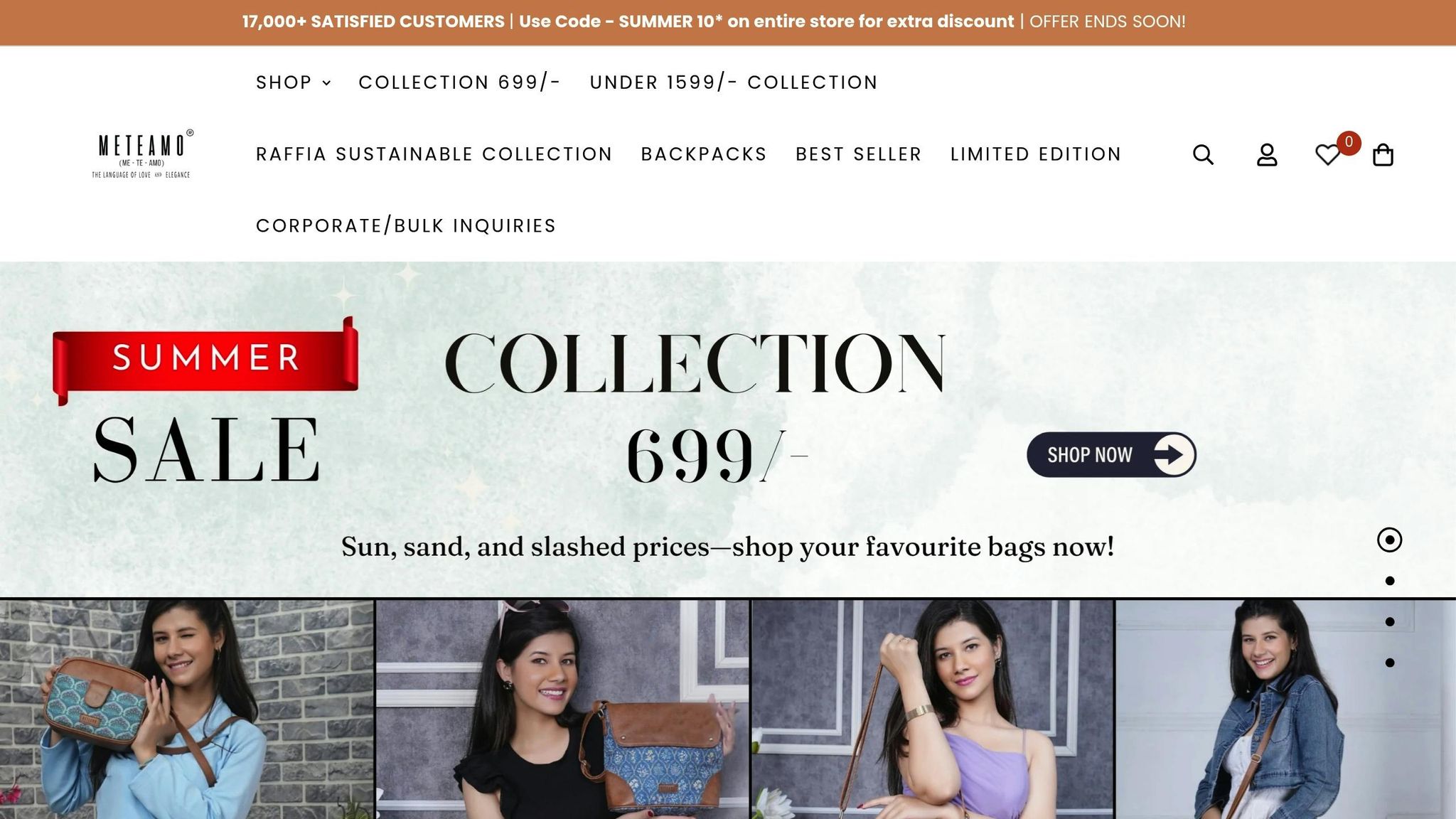
Me Te Amo stands out with its thoughtful use of jacquard cotton blends, raffia, hand-loom cotton, vegan leather trims, and recycled polyester linings. These materials not only elevate the aesthetic of each bag but also reflect the brand’s dedication to preserving traditional Indian weaving techniques.
The jacquard cotton blends bring intricate patterns to life, while raffia - a versatile natural fibre - adds a practical yet stylish touch. Together, they create bags that are both functional and visually striking. Hand-loom cotton, with its subtle variations, showcases the rich legacy of Indian textiles, making every piece feel authentic and unique.
All materials are carefully processed in the brand’s workshop, where skilled women artisans ensure high-quality craftsmanship. This hands-on approach not only guarantees superior quality but also supports local artisans and provides meaningful employment for women. Vegan leather trims add a polished structure to the bags without compromising on the brand's cruelty-free principles, while recycled polyester linings enhance durability and usability. These material choices lay the foundation for the brand’s signature styles and accessible pricing.
Main Styles and Pricing
Me Te Amo offers a diverse collection that includes sling bags, cross-bodies, totes, baguettes, clutches, puffer handbags, macramé designs, and cosmetic pouches. Each style is thoughtfully crafted to highlight the natural textures of the materials used.
Positioned as an "affordable-luxury" brand, Me Te Amo maintains pricing that ranges from ₹699 to ₹2,499, thanks to consistent 40–70% discounts off the original MRPs. Most items fall below ₹1,600, striking a perfect balance between boutique appeal and budget-friendly pricing, making these bags an ideal choice for both style-conscious and value-driven shoppers.
Eco-Friendly Practices and Social Impact
Beyond its stylish designs, Me Te Amo is committed to sustainability and ethical practices. The brand uses paper-based packaging and employs low-waste cutting techniques, reducing its environmental impact.
By exclusively working with cruelty-free materials, Me Te Amo stays true to its ethical fashion philosophy. Every handbag is handcrafted by women artisans, creating opportunities for local employment while keeping traditional craft techniques alive. This approach not only supports women-led initiatives but also bridges the gap between India’s rich textile heritage and modern design.
Simple practices like eco-friendly packaging and localised production further reinforce Me Te Amo’s dedication to responsible fashion. With its focus on sustainability, craftsmanship, and affordability, the brand delivers stylish options without compromising on its values.
Baggit: Cruelty-Free Synthetic Leather
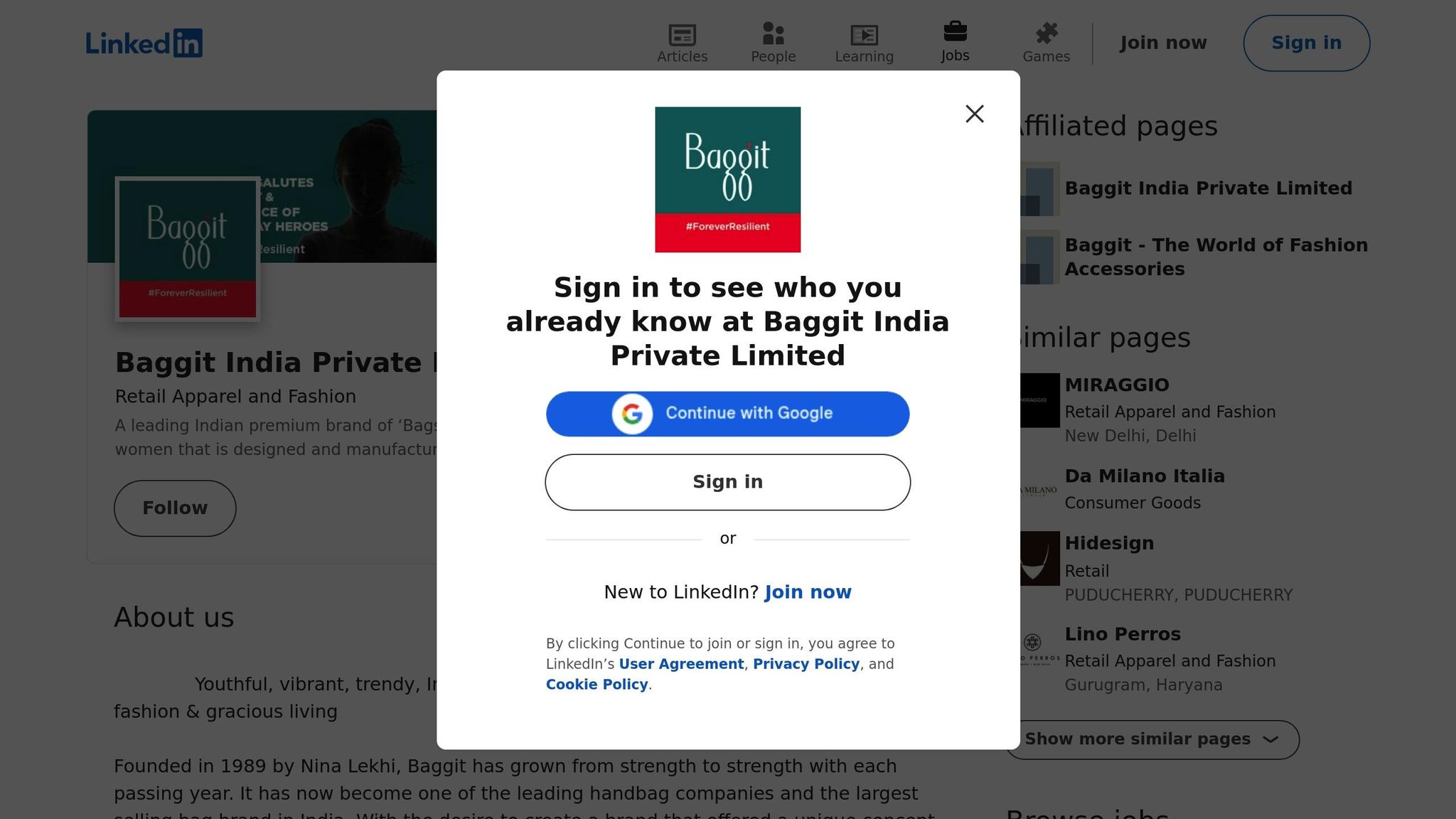
Baggit has carved a niche in the Indian handbag market by championing cruelty-free synthetic leather. Known for its ethical approach, the brand uses materials that replicate the look and feel of traditional leather without involving animal products, offering a stylish yet responsible alternative.
The product range includes purses, laptop bags, totes, and accessories. Each item is thoughtfully designed to combine style with functionality, featuring well-planned compartments and sturdy construction to meet the demands of daily use.
Baggit’s pricing strategy ensures its products are accessible to a wide audience. With prices ranging from ₹500 to ₹6,000, the brand appeals to budget-conscious shoppers as well as those seeking premium options. This balance aligns perfectly with its eco-conscious philosophy, making sustainable fashion more attainable.
In addition to its cruelty-free materials, Baggit actively promotes sustainable practices, encouraging eco-friendly purchasing habits. By proving that handbags can be both ethical and fashionable, the brand has become a key player in India’s sustainable fashion movement. Its designs reflect a growing industry trend towards innovative and responsible material use.
Baggit also takes its commitment to social responsibility further by supporting initiatives that empower women. This focus on ethical practices and inclusivity resonates strongly with today’s conscious consumers, solidifying its place as a leader in responsible fashion.
Zouk: Vegan Leather and Indian Textiles
Zouk brings together the charm of traditional Indian textiles and the practicality of 100% vegan materials, creating a harmonious blend of ethics and design. By combining vegan leather with heritage fabrics like Ikat and Jute Khadi, the brand crafts modern accessories that appeal to contemporary tastes while honouring India's rich cultural legacy.
Founded by Disha Singh and Pradeep Krishnakumar, Zouk was born out of a desire to create stylish, cruelty-free bags that celebrate Indian culture. Their efforts have earned them PETA approval, underscoring their commitment to vegan practices and ensuring no animal-derived materials are used in their products.
Zouk’s designs stand out for their pairing of modern silhouettes with vibrant Indian motifs. From tote bags and laptop bags to slings and wallets, their products feature striking Ikat patterns and Jute Khadi panels combined with vegan leather. These designs not only make a fashion statement but also reflect a deep connection to Indian heritage, resonating particularly with young, urban women who value both style and cultural identity.
Each Zouk bag is handcrafted by skilled local artisans, helping sustain traditional weaving communities. This approach preserves India's time-honoured techniques while providing a stable livelihood to craftspeople across the country.
The brand’s impact is evident in its numbers. By 2024, Zouk has catered to over 3 lakh (3,00,000) customers across India. Their strong online presence, including over 1,00,000 followers on Instagram, reflects their growing popularity. A high repeat purchase rate further highlights the loyalty of their customers, who appreciate the quality and ethical values behind the brand.
Zouk’s handbags are priced between ₹1,299 and ₹3,499, striking a balance between affordability and premium appeal. This pricing strategy, combined with their handcrafted designs, makes them a favourite among young, urban shoppers seeking stylish yet meaningful products.
Customer reviews on platforms like Amazon and Myntra rate the bags at an impressive 4.5/5, with users praising their unique designs, durability, and spaciousness. Many describe them as lightweight and practical, making them ideal for daily use, work, or travel.
Zouk also collaborates with artisans to create special collections that spotlight lesser-known weaving techniques from across India. These initiatives not only showcase the brand's dedication to sustainability but also breathe new life into traditional crafts, ensuring they remain relevant in today’s fashion landscape.
Allen Solly: Plant-Based Leather
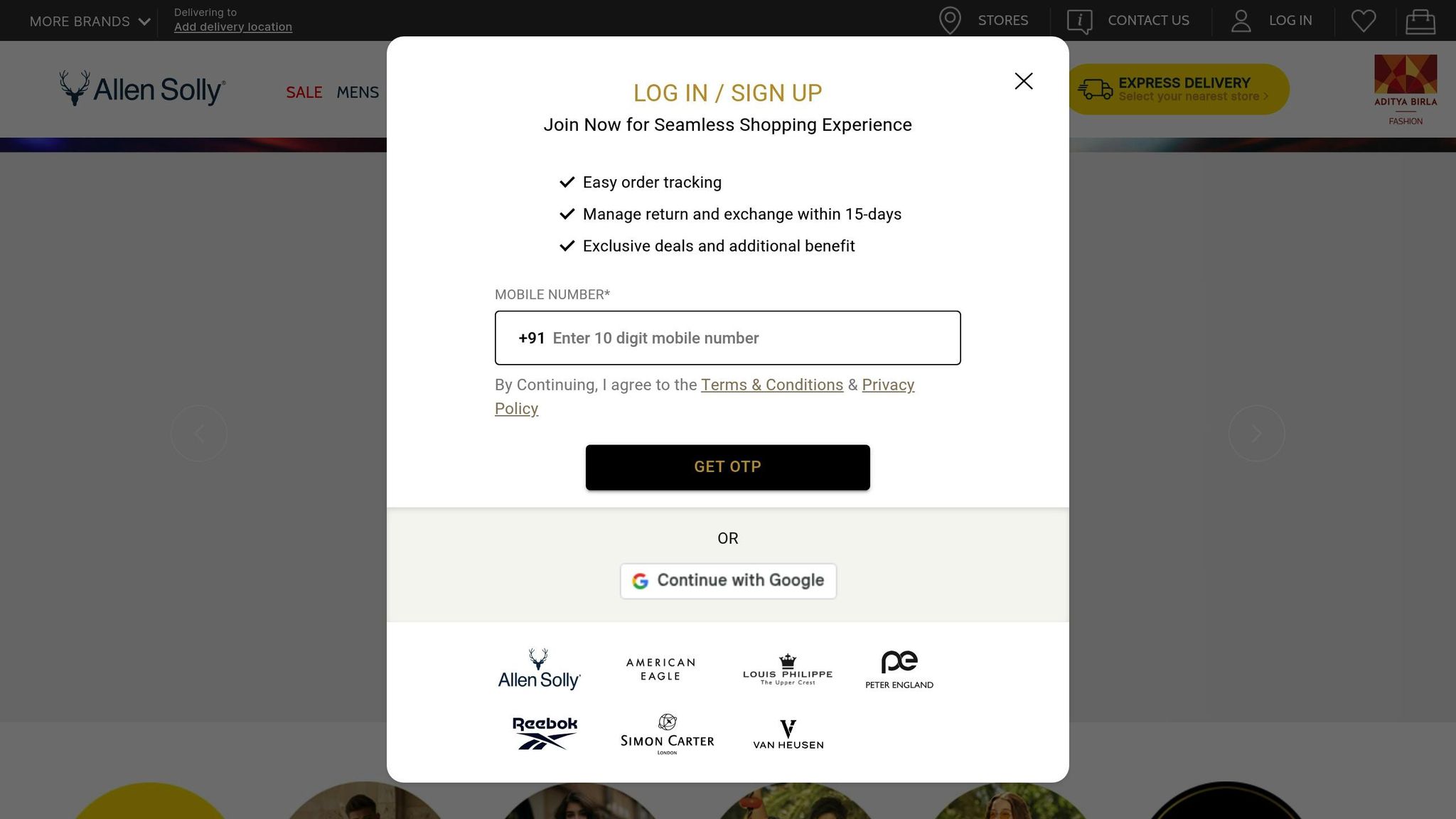
Allen Solly has stepped into the eco-friendly fashion scene with its PETA-approved vegan handbag collection, blending sustainability with style. This move highlights the brand's dedication to cruelty-free fashion, making waves in India's mainstream accessory market.
The collection features innovative materials like USDA-certified biobased apple leather, which contains 69% biobased carbon content, and cactus leather, with 66% biobased carbon content. These materials give new life to apple waste and utilise desert plants, offering an eco-friendly alternative that doesn’t compromise on durability or aesthetics.
"Our new vegan handbag collection represents a confluence of style, sustainability, and ethical responsibility. From the heart of the desert and the orchard, the brand is bringing innovative and conscious materials to the runway. This collection is not just about making a statement; it's about making a difference. By using groundbreaking materials like apple and cactus leather, we're not just setting trends but also advocating for a better future", - Richa Pai, COO, Allen Solly
The bags also feature interior linings made from 100% recycled plastic bottles and allergy-free gold accents, ensuring a balance of elegance and eco-consciousness.
Prices for these plant-based leather handbags range from ₹1,539 to ₹5,999, with original prices reaching up to ₹9,999. For instance, the Women Black Casual Sling Bag is available for ₹1,649 (originally ₹3,299), while the Women Brown Casual Handbag costs ₹5,999 (down from ₹9,999).
Customer reviews have been positive. In April 2024, Surendra Singh shared his thoughts on the Women Black Casual Sling Bag, saying, "It has great product design for the price I paid", after purchasing it for ₹1,649.
The growing demand for sustainable fashion aligns with global trends. The vegan leather market worldwide is expected to hit $204 million by 2030, with an annual growth rate of 11.4% from 2023. In India, more consumers are prioritising environmentally friendly and cruelty-free products.
Allen Solly’s plant-based collection includes a variety of styles - handbags, sling bags, totes, laptop bags, and wallets - available in colours like black, brown, blue, white, orange, and multi-coloured options. This ensures that customers can make eco-friendly choices without sacrificing style.
Hidesign: Vegetable-Tanned Leather
Hidesign seamlessly blends timeless craftsmanship with a modern, eco-conscious approach, carving a niche in India's luxury handbag market. With over 40 years of expertise, the brand has become synonymous with premium leather goods crafted using traditional vegetable-tanning methods - a nod to India's rich heritage of artisanal excellence. This approach aligns perfectly with the growing demand for environmentally responsible luxury.
At the heart of Hidesign's products lies vegetable-tanned leather. Unlike chrome tanning, which involves harmful chemicals and generates toxic waste, vegetable tanning uses natural tannins extracted from tree bark, leaves, and fruits. While this method takes longer, it produces leather that develops a distinctive patina over time, adding character and uniqueness to each piece.
Each Hidesign product is meticulously handcrafted by skilled artisans, ensuring exceptional quality and individuality. The collection features a variety of designs, including classic totes, structured satchels, crossbody bags, and briefcases. These pieces celebrate the natural textures and warm, earthy tones of vegetable-tanned leather. By focusing on minimalistic designs, Hidesign allows the inherent beauty of the leather to shine, catering to those who appreciate understated elegance.
Sustainability is woven into every aspect of Hidesign’s operations. From responsibly sourcing materials to maintaining ethical production practices, the brand demonstrates a commitment to reducing its environmental footprint. Its handbags are not only stylish but also durable, with the leather's strength ensuring a longer lifespan. Regular care with natural oils keeps the leather supple, making these bags a long-term investment in both quality and sustainability.
For eco-conscious consumers, Hidesign stands out as a brand that prioritises transparency and craftsmanship. As the fashion industry increasingly leans toward sustainable practices, Hidesign continues to solidify its position as a leader in creating luxury handbags that are as ethical as they are elegant.
sbb-itb-be0b177
Sabyasachi: Heritage Textiles in Luxury Handbags
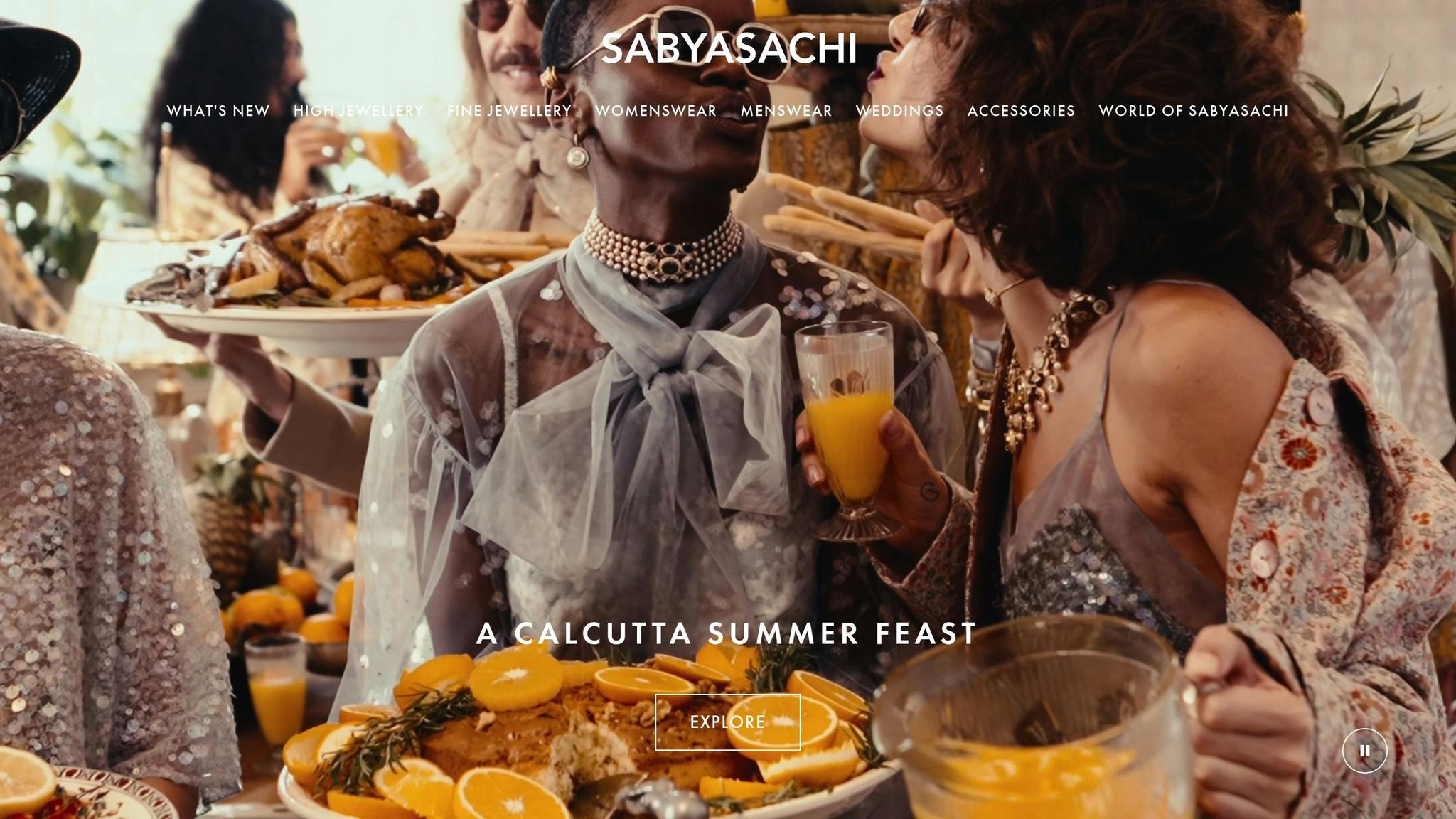
Sabyasachi has redefined luxury handbags by weaving India’s textile heritage into every design. These handbags are a perfect blend of tradition and modernity, showcasing intricate craftsmanship and a deep respect for India's cultural legacy.
Each bag is a masterpiece, crafted using a mix of materials like velvet, metal, and leather, adorned with exquisite details such as beads and sequins. The result? Accessories that feel timeless and elegant, while paying homage to traditional aesthetics. These handbags are more than just fashion statements - they're heirlooms that celebrate the richness of India’s artistry.
Dhruv Kapoor: Bold Colours and Textural Materials
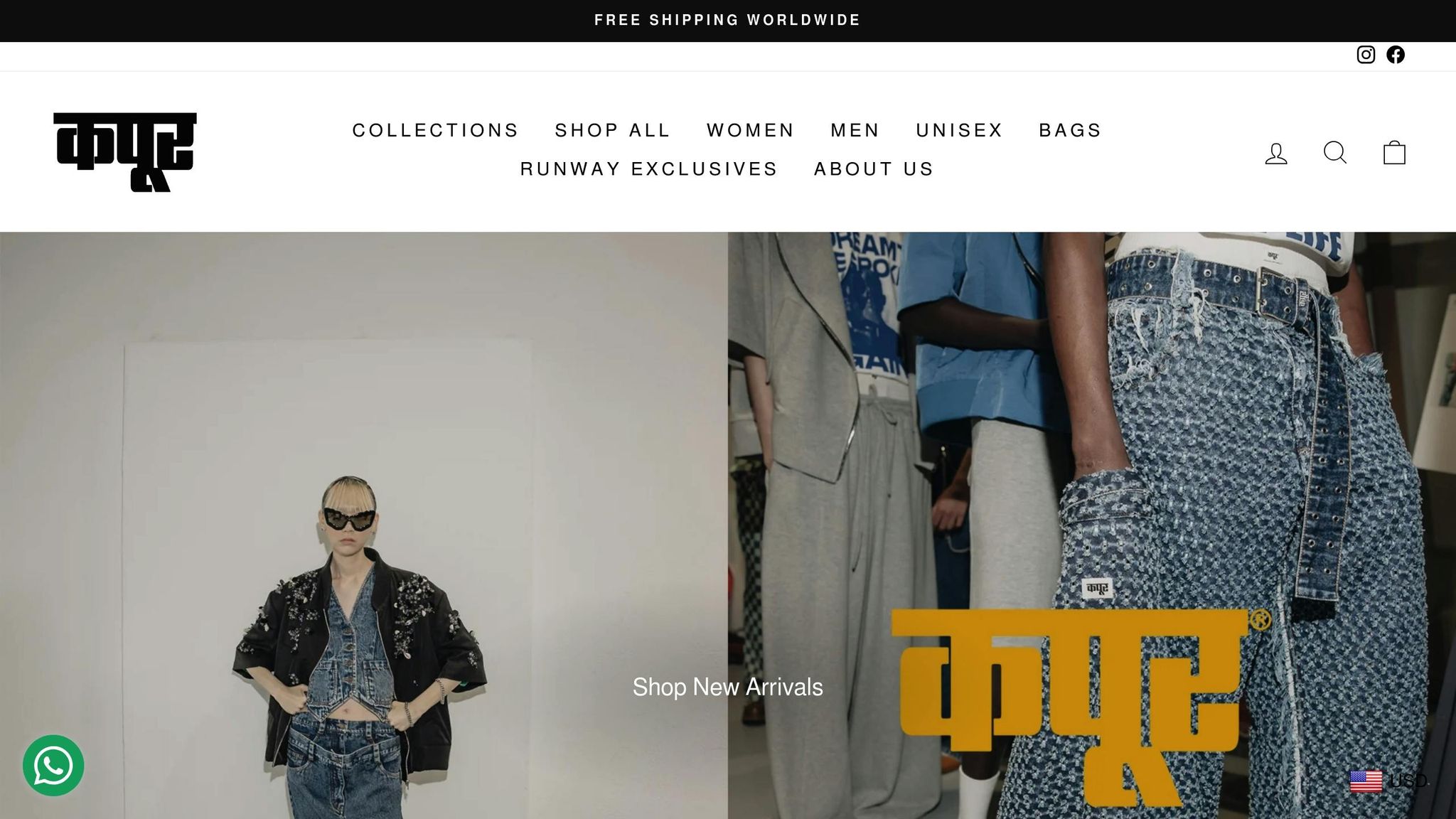
Dhruv Kapoor's handbags stand out with their daring colours and striking textures, turning each piece into a conversation starter.
The brand embraces vibrant shades like bright yellow, lagoon blue, crocodile green, and fuchsia pink, breaking away from traditional fashion norms. These bold choices have the power to elevate any outfit into something truly eye-catching.
What sets Dhruv Kapoor apart is its knack for contrasts. Think black and yellow rope handles that create a sharp, unexpected visual pop against the vibrant base colours. This design principle is a hallmark across the brand’s varied collections.
Take the "Seeker" collection, for instance. Its circular design, priced at ₹49,700, perfectly embodies this philosophy, combining boldness with elegance.
For those who appreciate texture, the "Distressed" line delivers in spades. Crafted from distressed genuine leather, these pieces add depth and dimension. The Distressed XL Tote in Ink Blue (₹1,04,120) and the Distressed Mini Belt Tote in Raspberry (₹57,760) feature standout 3-D cargo pockets, making them both functional and stylish.
The brand also delves into artisanal craftsmanship with creations like the Hand Crochet Maxi Belt Tote (₹96,000) and the Hand Crochet Mini Belt Tote (₹80,500). These pieces reimagine traditional crochet techniques, blending heritage with modern aesthetics.
Customisation is another key element of Dhruv Kapoor's design ethos. Handbags are thoughtfully designed to pair with key chains or charms, allowing buyers to add a personal touch.
Torani: Fine Fabrics and Detailed Embroidery
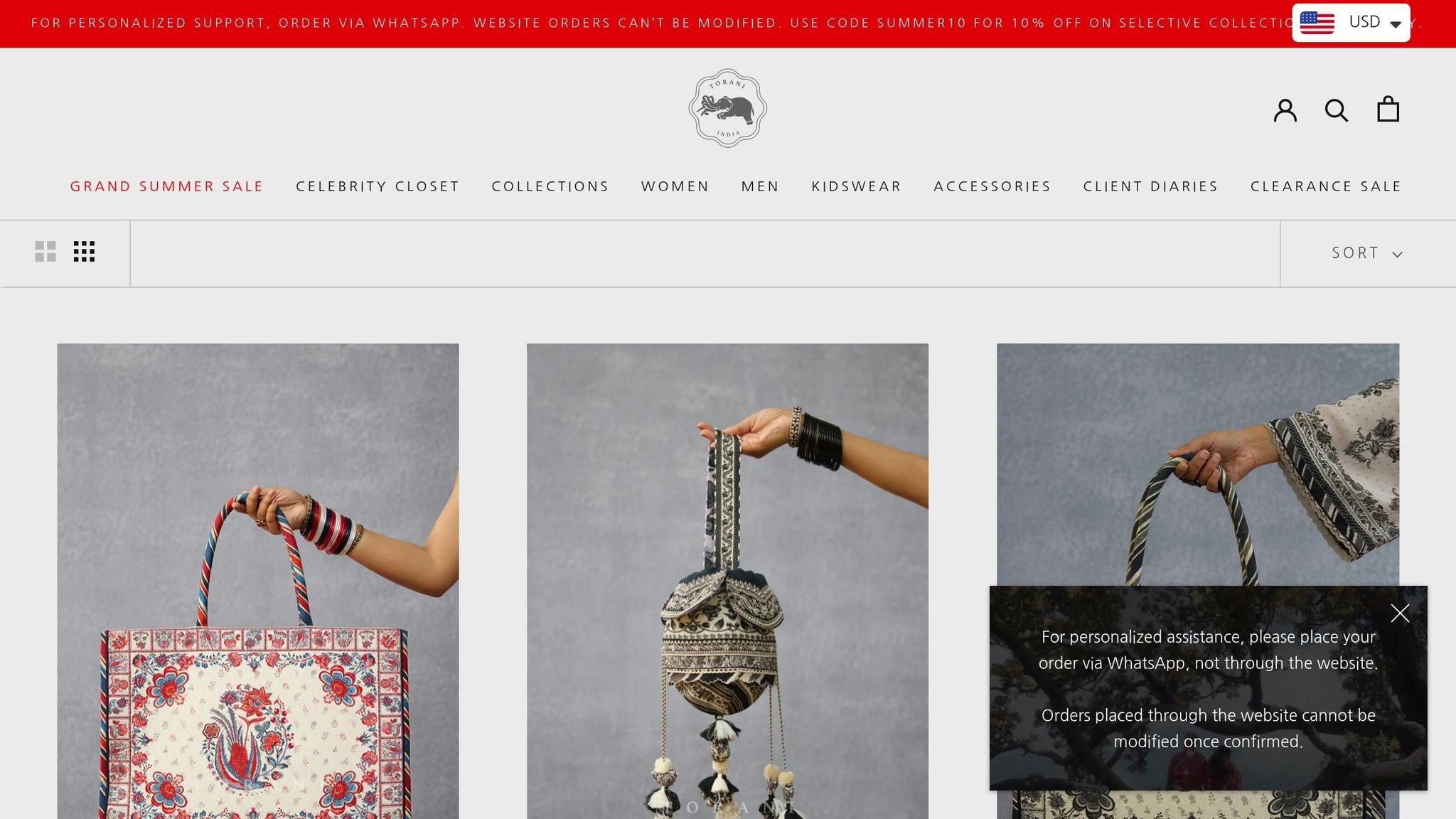
Torani beautifully combines traditional Indian artistry with modern aesthetics, using fine fabrics and intricate embroidery to craft accessories that honour age-old techniques. One of their signature approaches includes working with handwoven fabrics designed on historic Chanderi looms, a nod to India's rich textile legacy.
A standout example is the use of Jeni Silk, featured in the Dil Shaad Nura Handbag from the Juloos collection. This piece blends digital printing with hand-finished details, creating subtle textures and variations that make each item distinct. The result is a harmonious mix of technology and craftsmanship.
Torani’s creations are more than just accessories - they tell stories of nostalgia and showcase the exceptional skills of Indian artisans. By partnering directly with these craftsmen, the brand not only preserves traditional techniques but also reimagines them for contemporary fashion. Each handbag becomes a wearable piece of art, celebrating India's textile heritage in a modern context.
Through meticulous design and innovative material choices, Torani’s handbags stand out as conversation starters, seamlessly connecting India’s artisanal traditions with its evolving fashion landscape. The brand exemplifies how heritage and modernity can coexist beautifully in the world of design.
Tiger Marron: Eco-Friendly Materials
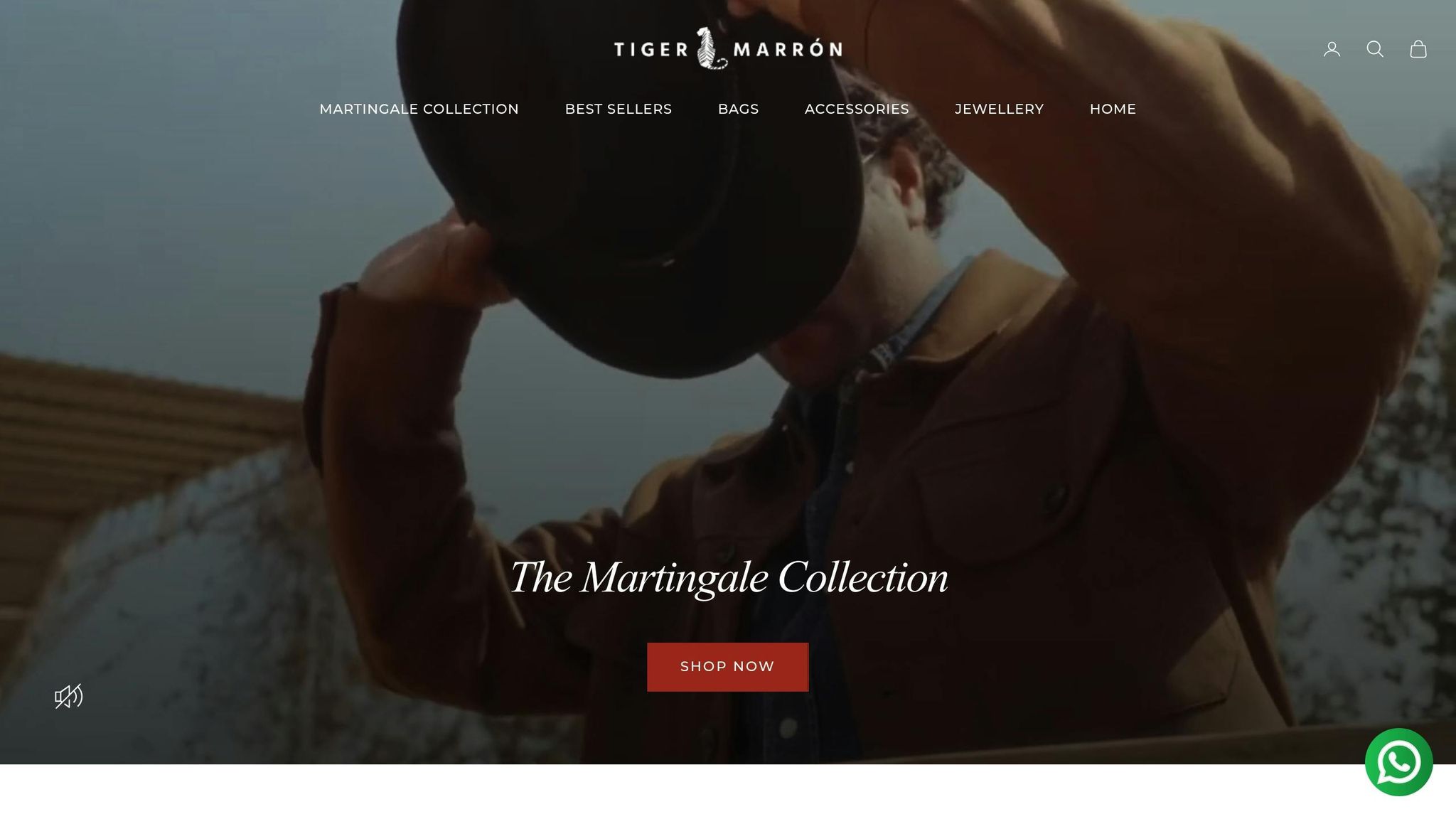
Tiger Marron has carved a niche in India's handbag market by prioritising environmental responsibility at the core of its design philosophy. The brand combines cutting-edge materials with ethical practices, creating products that are both stylish and environmentally conscious.
At the heart of their innovation is the use of biodegradable and water-based materials. Their collection includes vegan leather, recycled polyester, cactus leather, and fully biodegradable leather. They’ve even developed their own vegan leather using upcycled materials and natural chemicals. To further their eco-friendly approach, Tiger Marron incorporates organic cotton and vegetable-dyed fabrics, ensuring a chemical-free process.
Sustainability extends to their manufacturing methods. The metal hardware used in their products is crafted using water-saving techniques, reducing water consumption by 60%. Their processes also utilise ETP technology to recycle water up to five times and machinery that cuts electricity usage by 30%.
But Tiger Marron’s commitment doesn’t stop with materials. The brand champions fair trade by providing fair wages and safe working conditions for its employees. Looking ahead, they plan to incorporate solar and renewable energy sources into their supply chain.
Founder Saahil Tiger Nandrajog highlights the brand’s comprehensive approach to sustainability:
"Tiger Marrón is one of the only brands, especially in India, that is truly environmentally positive. As mentioned above for a brand to be sustainable it not only needs to use sustainable materials but its supply chain and manufacturing process need to be sustainable. Our vegan leather recipes are also developed by us and are a blend of upcycled materials. We like to be pro-environment in everything we do, especially our manufacturing process as only then can we truly say we are sustainable. Using green materials doesn't suffice, the whole supply chain needs to be sustainable. Additionally, our metal hardware lasts long so they don't need to be replaced or discarded, therefore reducing waste in the world."
Conclusion
The Indian handbag industry is experiencing a shift, blending innovative, eco-friendly materials with a deep respect for tradition. Brands are turning to materials like jacquard cotton blends, raffia, and plant-based leathers crafted from apple skin and pineapple. The result? Stylish, sustainable options that don’t force consumers to choose between fashion, affordability, and environmental responsibility.
At the heart of this change is the fusion of heritage and modern design. Brands like ME TE AMO are breathing new life into Indian weaving techniques, presenting them in contemporary silhouettes. Others are incorporating traditional textiles and intricate embroidery into designs that resonate with today’s fashion-savvy consumers. These handbags are more than accessories - they’re statements that honour India’s rich textile legacy.
Affordability plays a crucial role in this transformation. With price points ranging from ₹699 to ₹2,499, these brands are making sustainable fashion accessible to shoppers in Tier-1 and Tier-2 cities alike. This inclusive pricing strategy ensures that eco-conscious choices are within reach for a broader audience.
What’s more, these brands are driving real social change. By employing women artisans and sharing their stories, they’re not only supporting local communities but also fostering a deeper connection with consumers who value ethical practices. This transparent, women-led approach adds a layer of purpose to every purchase.
For consumers who care about style and sustainability, choosing these handbags means aligning their values with their shopping habits. Each purchase supports environmental protection, uplifts artisans, and encourages the industry to embrace greener practices.
As the industry looks ahead, artisan collaborations and expanded accessory lines are setting the stage for Indian handbag brands to lead on a global scale. They’re shaping the future of responsible fashion while staying true to their roots in quality, affordability, and cultural authenticity.
FAQs
What makes Me Te Amo's use of jacquard cotton and raffia special for its handbags?
Me Te Amo's choice of jacquard cotton and raffia is a nod to both sustainability and India’s rich weaving heritage. These materials not only align with eco-conscious values but also carry the essence of traditional artistry, making every handbag feel special and rooted in culture.
Each piece is meticulously handcrafted, showcasing rich textures and detailed patterns that bring a refined elegance to the designs. By working with these fabrics, Me Te Amo seamlessly blends time-honoured craftsmanship with modern aesthetics, delivering bags that are stylish, long-lasting, and gentle on the planet.
How does Me Te Amo use vegan leather and recycled polyester to support its sustainability goals?
Me Te Amo integrates vegan leather trims and recycled polyester linings as part of its effort to promote eco-conscious practices. By opting for vegan leather, the brand avoids animal-based materials, ensuring cruelty-free production. Meanwhile, using recycled polyester reduces plastic waste by repurposing existing materials.
These thoughtful choices help lower environmental impact while showcasing the brand's focus on sustainable fashion and responsible craftsmanship. Each handbag becomes more than just an accessory - it’s a step towards mindful shopping for the environmentally aware consumer.
How does Me Te Amo empower local artisans and promote sustainability through its handbag designs?
Me Te Amo uplifts local artisans by embracing handcrafted methods that honour India's traditional weaving techniques. The brand is committed to using environmentally conscious materials like jacquard cotton blends, raffia, and hand-loom cotton. What’s more, they ensure their artisans - many of whom are women - receive fair wages for their exceptional work.
With a strong emphasis on sustainability, Me Te Amo employs low-waste production practices, cruelty-free materials, and paper-based packaging. This approach not only minimises their ecological footprint but also helps preserve India’s rich artisanal legacy. Every handbag they craft tells a story of ethical artistry and a dedication to responsible craftsmanship.




